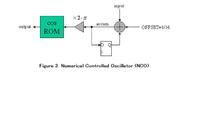arvindkts
Newbie level 3
Re: nco code
vinodkumar said:Is this synthesizble code.byee
Added after 6 minutes:
hi this is the code for NCO/DDS
LIBRARY ieee;
USE ieee.std_logic_1164.all;
USE IEEE.numeric_std.ALL;
ENTITY nco IS
-- Declarations
port ( clk : in std_logic;
reset : in std_logic;
din : in signed(11 downto 0);
dout : out signed(7 downto 0)
);
END nco ;
-- hds interface_end
ARCHITECTURE behavior OF nco IS
type vectype is array (0 to 256) of signed(7 downto 0);
-- ROM cosrom
constant cosrom : vectype := (
0 => "01111111",
1 => "01111111",
2 => "01111111",
3 => "01111111",
4 => "01111111",
5 => "01111111",
6 => "01111111",
7 => "01111111",
8 => "01111111",
9 => "01111111",
10 => "01111111",
11 => "01111111",
12 => "01111111",
13 => "01111111",
14 => "01111111",
15 => "01111111",
16 => "01111111",
17 => "01111111",
18 => "01111111",
19 => "01111111",
20 => "01111111",
21 => "01111111",
22 => "01111111",
23 => "01111111",
24 => "01111111",
25 => "01111110",
26 => "01111110",
27 => "01111110",
28 => "01111110",
29 => "01111110",
30 => "01111110",
31 => "01111110",
32 => "01111110",
33 => "01111101",
34 => "01111101",
35 => "01111101",
36 => "01111101",
37 => "01111101",
38 => "01111101",
39 => "01111100",
40 => "01111100",
41 => "01111100",
42 => "01111100",
43 => "01111100",
44 => "01111011",
45 => "01111011",
46 => "01111011",
47 => "01111011",
48 => "01111010",
49 => "01111010",
50 => "01111010",
51 => "01111010",
52 => "01111010",
53 => "01111001",
54 => "01111001",
55 => "01111001",
56 => "01111001",
57 => "01111000",
58 => "01111000",
59 => "01111000",
60 => "01110111",
61 => "01110111",
62 => "01110111",
63 => "01110111",
64 => "01110110",
65 => "01110110",
66 => "01110110",
67 => "01110101",
68 => "01110101",
69 => "01110101",
70 => "01110100",
71 => "01110100",
72 => "01110100",
73 => "01110011",
74 => "01110011",
75 => "01110011",
76 => "01110010",
77 => "01110010",
78 => "01110010",
79 => "01110001",
80 => "01110001",
81 => "01110001",
82 => "01110000",
83 => "01110000",
84 => "01101111",
85 => "01101111",
86 => "01101111",
87 => "01101110",
88 => "01101110",
89 => "01101101",
90 => "01101101",
91 => "01101101",
92 => "01101100",
93 => "01101100",
94 => "01101011",
95 => "01101011",
96 => "01101010",
97 => "01101010",
98 => "01101010",
99 => "01101001",
100 => "01101001",
101 => "01101000",
102 => "01101000",
103 => "01100111",
104 => "01100111",
105 => "01100110",
106 => "01100110",
107 => "01100101",
108 => "01100101",
109 => "01100100",
110 => "01100100",
111 => "01100011",
112 => "01100011",
113 => "01100010",
114 => "01100010",
115 => "01100001",
116 => "01100001",
117 => "01100000",
118 => "01100000",
119 => "01011111",
120 => "01011111",
121 => "01011110",
122 => "01011110",
123 => "01011101",
124 => "01011101",
125 => "01011100",
126 => "01011100",
127 => "01011011",
128 => "01011011",
129 => "01011010",
130 => "01011001",
131 => "01011001",
132 => "01011000",
133 => "01011000",
134 => "01010111",
135 => "01010111",
136 => "01010110",
137 => "01010101",
138 => "01010101",
139 => "01010100",
140 => "01010100",
141 => "01010011",
142 => "01010010",
143 => "01010010",
144 => "01010001",
145 => "01010001",
146 => "01010000",
147 => "01001111",
148 => "01001111",
149 => "01001110",
150 => "01001110",
151 => "01001101",
152 => "01001100",
153 => "01001100",
154 => "01001011",
155 => "01001010",
156 => "01001010",
157 => "01001001",
158 => "01001000",
159 => "01001000",
160 => "01000111",
161 => "01000111",
162 => "01000110",
163 => "01000101",
164 => "01000101",
165 => "01000100",
166 => "01000011",
167 => "01000011",
168 => "01000010",
169 => "01000001",
170 => "01000001",
171 => "01000000",
172 => "00111111",
173 => "00111110",
174 => "00111110",
175 => "00111101",
176 => "00111100",
177 => "00111100",
178 => "00111011",
179 => "00111010",
180 => "00111010",
181 => "00111001",
182 => "00111000",
183 => "00111000",
184 => "00110111",
185 => "00110110",
186 => "00110101",
187 => "00110101",
188 => "00110100",
189 => "00110011",
190 => "00110011",
191 => "00110010",
192 => "00110001",
193 => "00110000",
194 => "00110000",
195 => "00101111",
196 => "00101110",
197 => "00101101",
198 => "00101101",
199 => "00101100",
200 => "00101011",
201 => "00101010",
202 => "00101010",
203 => "00101001",
204 => "00101000",
205 => "00100111",
206 => "00100111",
207 => "00100110",
208 => "00100101",
209 => "00100100",
210 => "00100100",
211 => "00100011",
212 => "00100010",
213 => "00100001",
214 => "00100001",
215 => "00100000",
216 => "00011111",
217 => "00011110",
218 => "00011110",
219 => "00011101",
220 => "00011100",
221 => "00011011",
222 => "00011011",
223 => "00011010",
224 => "00011001",
225 => "00011000",
226 => "00011000",
227 => "00010111",
228 => "00010110",
229 => "00010101",
230 => "00010100",
231 => "00010100",
232 => "00010011",
233 => "00010010",
234 => "00010001",
235 => "00010001",
236 => "00010000",
237 => "00001111",
238 => "00001110",
239 => "00001101",
240 => "00001101",
241 => "00001100",
242 => "00001011",
243 => "00001010",
244 => "00001010",
245 => "00001001",
246 => "00001000",
247 => "00000111",
248 => "00000110",
249 => "00000110",
250 => "00000101",
251 => "00000100",
252 => "00000011",
253 => "00000010",
254 => "00000010",
255 => "00000001",
256 => "00000000");
signal dtemp : unsigned(17 downto 0);
signal din_buf : signed(17 downto 0);
signal dtemp1 : integer;
constant offset : unsigned(17 downto 0) := "000100000000000000";
begin
process(CLK, RESET)
begin
if (RESET='1') then
dout <= (others => '0');
din_buf <= (others => '0');
dtemp <= (others => '0');
dtemp1 <= 0;
elsif rising_edge(CLK) then
din_buf <= din(11)&din(11)&din(11)&din(11)&din(11)&din(11)&din;
dtemp <= dtemp + unsigned(din_buf) + offset;
dtemp1 <= to_integer(dtemp(17 downto 8));
if (dtemp1 >= 0) and (dtemp1 < 257) then
dout <= cosrom(dtemp1);
elsif (dtemp1 >= 257) and (dtemp1 < 513) then
dout <= -cosrom(512-dtemp1);
elsif (dtemp1 >= 513) and (dtemp1 < 769) then
dout <= -cosrom(dtemp1-512);
else
dout <= cosrom(1024-dtemp1);
end if;
end if;
end process;
END behavior;
Added after 1 minutes:
i hope this helped uif so press help button.
